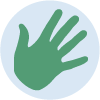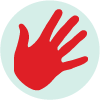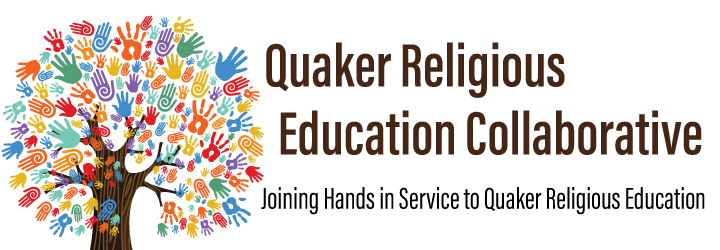
Topic: The current disruption in society is shaking the foundations of culture and faith. In the turmoil, youth and young adults from diverse backgrounds may seek spiritual community in Friends Meetings. Children of color who connect with Friends at Quaker camp may come to monthly and yearly meetings hoping for supportive community. How can Friends’ Meetings embody Martin Luther King’s vision of the Beloved Community?
- How can we, as Quaker religious educators, do the deep personal work of becoming anti-racist?
- How can we prepare our monthly meetings to welcome diverse young newcomers?
- What discernment and anti-racism training should be taken by volunteers who work with children?
- During this time when geography is less of a barrier, how can Friends of color mentor young people who seek community in Quaker meetings?
Facilitators:
TUE Nikki Holland (Belize Friends Church, New Association of Friends)
THU Sita Diehl, Madison WI, NYM, QREC
Conversation Starters
TUE
Khalila Lomax is the Coordinator for the STRIDE program of Baltimore Yearly Meeting. STRIDE supports diverse youth to attend Quaker summer camp under the care of BYM, but the program has grown to foster diverse leadership within the Society of Friends and beyond. There are STRIDE groups in Baltimore, Philadelphia, the Greater DC Area that work to:
1) Create access for youth in each of these cities to attend Baltimore Yearly Meeting summer camps and
2) Create communities of genuine diversity, equity, and inclusion in these youth serving programs.
STRIDE groups provide leadership opportunities for young adults as part of our core group and opportunities for volunteers of all ages! These groups use a combination of action and self-reflection to pursue goals.
Mila Hamilton: Mila (she/her/hers) has lived in Minneapolis for the past 12 years. She has spent most of her time here working with young people, both in community and in schools. She is currently connected with AFSC and their various programs around abolition and anti-racist work. She lives in South Minneapolis, 4 blocks from where this uprising started and has been doing that work since that time. In Quaker-land, she’s a graduate of Scattergood, she attends Twin Cities Friends, NYM. Anti-racist/abolition work has been her leading since she was a child – and it’s something she has continued to grow into – it’s learning every moment of every day. She is also very aware that young people are central to this work – and ultimately lift it up and drive it so she firmly believes it is imperative to center their voices, experiences, and knowings in our communities.
THU
Ten Henson: (they/them) Guilford College, known by many as Ten, grew up in Pennsylvania and is a member of Philadelphia Yearly Meeting. As a queer afro-latinx growing up in a predominantly white space Ten found it hard to find representation and support in a lot of the spaces they showed up in. This pushed them to search for more in the work they pursued. During the time they were pursuing their undergraduate degree from Guilford College, Ten began to fall in love with community healing and facilitation. Their passions helped them to facilitate groups at Guilford College, and return to their roots and has helped PhYM work through some of the challenges of reconciling with a racist past and how to move forward with accountability and love on the front lines. Currently Ten still facilitates around the topic of anti-blackness and Quakerism with PhYM, and currently resides in North Carolina as the NC Campaign Coordinator for Repro-action, advancing access to abortion and reproductive justice across the state and the country.
Mila Hamilton: (See above)
Conversation Summary:
Khalia: Youth in the STRIDE program who have experienced a deep sense of community at Quaker camps want to stay connected and give back as young adults. Authentic relationship rooted in community can be life-changing, motivating young people to seek ongoing connection with Quakers.
This is an ongoing conversation within STRIDE. In Baltimore, Washington DC and Philadelphia, young adults who have done Quaker camps come back and give to the meeting by participating in STRIDE. We are making the commitment to creating a more diverse community in Quaker camping, particularly BYM. Members describe their commitment as a form of worship. STRIDE is a home meeting for many of these members. Way for young adults to take power and have power. Mutual aid to support members. In order to have a diverse community, there has to be space for them.
Even though camps having been closed, STRIDE has been active sending care packages, distribute masks and water, hosting movie nights. It is an authentic community where members are really committed and excited to be together. It is disappointing that there are still members who are cautious about joining with the larger BYM community because of previous experiences. The main thing is that it is a community where all people are welcomed and celebrated.
Sita: Madison meeting has really leaned into this conversation since George Floyd’s murder. Friends wonder how to be open and welcoming to the protestors. We are showing-up to protests wearing plain grey shirts that say ‘Quaker’, handing-out water bottles. Are there other ways to be open and supportive at this time?
Khalila: These are good strategies that are authentic, and word will spread by word of mouth. It’s a way to plant seeds. What are the needs of people who are organizing and how can we support them? What are the different roles that are needed and how can we fill some of the appropriate roles for us?
Windy: As a member of BYM, STRIDE’s work is both seen as important and also as controversial at times. Observation is understanding who we want to be and holding that in relation to where we are now. How has STRIDE maintained its integrity through this tension?
Khalila: Lean into one another, turn to each other in order to hold onto our moral compass. Since STRIDE is a group of young people, there can be a sense of urgency that the larger community may not always understand. So, it is important to understand where compromise is ok and where compromise is not ok. Remind people that we have the same common goal.
Beth: Showing-up and taking action seeds change in ourselves. And the action invites others to join with us.
Kim: Holding-up certain words: celebrating, inviting … a lot to hold and think and pray about here.
Sita invited Mila to talk more about the inward work that we need to do. Can you say more about this work you have done yourself and have invited others to do?
Mila: For me as a Friend, recognizing I grew up as a white person in the US and that shows up in the Society of Friends. Unlearning and recognizing my internalized racial superiority is part of my practice as being a Quaker.
Khalila – Sometimes there is a rush to have diversity, but it isn’t authentic relationship and so it doesn’t stick or last. We need to look deeply at why the authentic relationships aren’t happening. This can be uncomfortable. One-way relationships can be a problem. Friends want folks to come to meeting, but we don’t show-up in places where those folks are likely to be. When you create a space that is really open and a good space for people of color, then folks will show up and talk to each other about those spaces. It can also be hard that people of color have to show-up and teach and be a leader and represent in a way that leaves them alone. People of color have to have a stamina that white people often don’t around racism.
There is a sense of tokenism when white Friends talk about diversifying the meeting and they try to invite people of color to the Meeting House. But the question is, “How often do you go to their house? How often do you partner with and support the work of congregations that mostly have people of color?” There should be a dual exchange, a give and take. There are interdenominational groups in most communities that have this dynamic going.
Nikki: Reminds me of white people being afraid of making mistakes and there isn’t trust that you can make mistakes and still repair.
Khalila: Often, white people hesitate to connect with people of color because they worry that they’ll do or say something wrong, that they will unintentionally insult them or hurt their feelings. Instead, trust the people you are working with and ask them to correct you. Be willing to make mistakes and to learn.
Nikki: It’s like learning a language. In the beginning you feel like you will never get it, but you gradually learn over time.
Minerva: People of Color are often expected to lead a Meeting’s anti-racism work, but it needs to be a two-sided thing. It’s not our conversation as people of color. I am not here to speak for Latinas, I am not prepared to lead this. It is not my problem.
Khalila – Sometimes folks don’t respect those boundaries and don’t honor people of color that don’t want to lead on these issues. It is unjust to put these burdens on folks when they don’t want it. Some people are willing to take the lead on these issues, but others don’t and we need to realize where someone is in this regard.
Mila: It takes a long time to become a f/Friend. Regardless of whether you are from a minority culture, it’s hard for people to find their way into Friends Meetings. The important thing is to communicate that you care about the person as a person, not as a stereotype. Look to the mutual divinity in people, a shared focus on our spiritual experience as Quakers.
Joan: Charles Blow gives a really sharp analysis in this lecture: https://vimeo.com/454428088. It’s long, but really worth listening to. Even if you listen to the whole think at once, break and journal, and go back and forth through it during time you have set aside for it. Something we REALLY need to do as white people. SET ASIDE TIME for personal work. A tool for white people is by Amanda Kemp, STOP being afraid: 5 steps to transform conversations about racism.
Dyresha: It is important to be authentic, to take the time to get to know people and to truly share stories. Friends have trouble with being welcoming in general. When a person of color is not welcomed it triggers questions of race.
The goal should not be to get more people of color in the Meeting, but to make space for welcoming people of color who have a leading for what we are about.
- A longing for stillness;
- Looking for a community that values justice.
Also, tokenism is when we just want a person of color or a youth, rather than actually know what the leading the person has and help them find the way to follow that leading. Holding-out what we have so we are reaching-out to people who want what we offer. Making sure we are reaching-out to diverse groups. Authentic interest in who people are and what they have passion for, rather than being interested in them as a person of color who has certain stereotyped preferences.
Khalila: Being tokenized can really hurt authentic relationships. Make sure people have the support they need to truly feel part of the Meeting community.
Thursday Summary
Sita opened with description of QREC: a place that offers resources and conversations across the generations and the breadth of Quaker faith to deepen practices to teach, mentor. In these days of disruption, people looking for community, with the quiet offering Friends can provide, how do we prepare Meetings to be places that welcome young people? What will help meetings live into being the Beloved Community? The planning meeting for this conversation included young adult Friends to seed this conversation. Mila and Ten will be conversation starters tonight.
Ten: Initial thoughts as Ten transitioned from YM youth programs to Quaker college, some of the energy was familiar – with college being more political and messy; yet Ten could see details heretofore not ‘seen’ at Phila YM which were there.
Where are the young Friends today? The experience of being told ‘not powerful’ as youth, as people of color in the YM, at the college, when they have important contributions, power. Young Friends, middle schoolers deserve a place within the Meeting for Business… the facing bench…in decision making at Yearly Meeting. They may ask important questions never anticipated by those usually in business meetings. They can and should be encouraged to participate.
Mila: Affirmed Ten’s observations. After Scattergood School, Mila left Quakers for maybe 10 years before coming back to current activities @ AFSC. Where are the youth? Why aren’t the youth leaders being centered? Too often question like ‘why not more diversity’ invites tokenism. It’s an important conversation. How does it show up? White people need to do deep work; we need to do more than flex, extend out; we need our own deep internal work. Antiracism committee in Mila’s meeting want to ‘get more people of color’ but if whites have not done their work the racism will show up and hurt. Look at power structures, to uproot the white supremacy that many see in our own meetings. Black people of color do show up and Friends need to hold themselves accountable to the way behavior show up as racist and learn and continue the work.
We were invited to sit with these thoughts, to speak out of the silence as led.
Cameron spoke following quiet reflection. Black church in her community that was built on grounds Quakers sold them in 1800s for $1 is now in need of repair; Meeting is helping the congregation with costly repair. The community at Goose Creek is learning more, using antiracism to learn; a little library outside the meeting also offers antiracist books. It’s been helpful to remember that from seeds the trees do grow, but it takes time before there is shade to sit under. Commitment to inclusivity and participating in outside groups in the larger community helps. Making mistakes is a way to learn, to lean into the language. Youth in the Meeting are encouraged to attend 3 committee meetings during the year to speak as they are moved and to learn what Meeting is about.
Greg: diversity is larger than race, and all needs addressing. Rather than limit, conversation should open more, beyond the blinders of the liberal/white community many of our meetings are. Greg is learning about racism and antiracism. At a given time we can be racist, then be antiracist; we need to learn to continue growing… like in Quakerism we keep growing in our worship. Growing into antiracism is like growing into Spirit.
Ten: Cameron shows how joining with others in work others do is important. Quakers do not have to invent the wheel, though they seem to want always to do that – forgetting that enslaved people were working on their own organizing. There is the current opportunity to engage in support with immigration, and to address oppressions, dangers to the trans community. What will white Friends do to recognize and deal with oppression? We cannot make it less hard or less uncomfortable. Will Quakers just keep doing what they are doing? Antiracism and being in Meeting. Same thing. Spirit does not need white supremacy.
Kathy Hersh: Continuing revelation is not possible unless we keep our minds open and teachable.
Mila: The experience of hearing Friends ask what to do; the demands are clear https://m4bl.org/policy-platforms/, Friends continue to say ‘oh we cannot do this… how about this?’ to something much less that does not change things.
Ten: Their professors have deep knowledge, yet action seems hard to pursue… just staying with The Best Knowledge is not the same as taking action. Do we wait for group movement, or are we ready to act ourselves? GO to a protest and follow where Spirit leads.
Greg Woods: Discernment doesn’t always have to take months to be considered faithfully processed
Joan Broadfield: Fox and others wrote to the king without the ‘sense of the meeting’ conversation.
Kathy Hersh noted a Meeting can act in solidarity in the community; a Meeting acts with others in the interfaith community to effect change locally on important issues, to solve problems in housing, gun violence – showing up with sizeable group, engaging public servants, and with research, acting in collaboration.
Beverly said acting like allies is insufficient; beyond allies, we need to be accomplices. Whites, in particular, need to show up to make good trouble, like at city council meetings when decisions are being made, votes are being taken. Our presence amplifies the message and protects people from abuse.
Sita: Too often white people are afraid of making mistakes, but stepping into a scary place with full selves, ready to learn, and taking care, is important
Kody spoke of training muscles: to be told about mistakes, to be in conflict. Muscles build with practice/training, by making mistakes. Examining white supremacy, sitting with God – both equally engage spiritual engagement. By this spiritual practice, being spiritually present – deep worship, deep work, will make meeting a place where people well want to be.
Sita: This means trusting Spirit to help – pain, inadequacy as well as splendor; we need to be ready for all of it.
Aurelia resonated with much heard and pointed out that many Friends oppose Movement for Black Lives – #BLM – who they view as disruptive, violent. This discomfort reflects white supremacy; letting go of their need to lead is essential.
Ten: White Quakers who are working in antiracist ways must confront those who are unaccepting of #BLM and realize that this is the means to work forward. If this is not acceptable, it will not change. The activity shows the importance of the BLM voice. “We cannot keep letting people die.” We can follow those who lead in the direction that supports those voices.
Cameron Hughes: We had a BLM protest here in Leesburg VA with over 1,000 people. Many of our member joined and we were able to finally get a Confederate soldier statue off our courthouse lawn.
Kathy Hersh: Mistakes are how we learn best.
Mila Hamilton: Let your life speak…
Kathy Hersh: Do Justice, Love Mercy, Walk Humbly – Micah
Cameron Hughes: 100% we cannot keep letting people die.
Joan: This also is the issue of Quakers who think that the movement which disrupts is the one responsible for the violence of others.
Cameron: A lot of our members have joined the local NAACP
Joan: We should also really live in the world that we know needs to be here, as John Lewis did
Denise Williams: Quaker process well facilitated allows for deep listening and truth speaking, but it requires making meaningful paid and volunteer spaces for friends of color to lead and create safe spaces and teamwork based on integrity.
Guinevere: Can there be healing in our country and Quaker Meeting’s when some of our Members and citizens continue to turn a blind eye to Black, People of Color, Differently Abled, and LBGTQI people dying, and having fewer rights in our society? I think Ten is right the time is come to say either get over your self-hatred and fear fellow straight white people and get on board with healing our Meeting and country. How can we find that new way – modeling a different way than the world, not splitting, but being clear the importance of the movement forward?
Announcements: Two ways to be added to the QREC announcement list:
- Subscribe to receive announcements of QREC news and events on the website, AND/OR
- Become a member of QREC. There is no required fee, but contributions are gratefully received.
Gratitude
Closing Worship
Recommended Resources:
Black Fire: African American Quakers on Spirituality and Human Rights, Hal Weaver, Paul Kriese, and Steve Angell (Eds.) 2012, QuakerPress.
Fit for Freedom, Not for Friendship, Donna McDaniel and Vanessa Julye, QuakerPress, 2009
The Shape We Take: Growing Diverse Leadership in Baltimore Yearly Meeting, Dyresha Harris, May 2017:
Taking STRIDEs: BYM’s Growing Diverse Leadership Initiative Provides Expanded Opportunities to Live out the Quaker Value of Equality in a World that Badly Needs It, Dyresha Harris, 10.2016: https://bymcamps.org/taking-strides/
Clearing the Way for Community, Dyresha Harris, 2017:
Assessing Racial Inclusion and Justice: A Quaker Meeting Self-Assessment Tool, Friends Meeting of Washington
Is this Really a Racial Reckoning? (Video below), Charles Blow, Oct 1, 2020. University of Texas lecture, 6th Annual Frances Tarlton “Sissy” Farenthold Endowed Lecture in Peace, Social Justice and Human Rights
Stop Being Afraid! 5 Steps to Transform your Conversations about Racism: Lean in and Plant a Seed (Racial Justice from the H.E.A.R.T.), Amanda Kemp
Vision for Black Lives, 2020 Policy Platform, Movement for Black Lives
Ladder of Young People’s Involvement, Roger Hart
Sister Song This is another reproductive justice org that has webinars for people folks who become members (affordable fee). Past webinars available with a specific one about how white folks can be better accomplices rather than allies
Emergent Strategy: Shaping Change, Changing Worlds, Adrienne Maree Brown
Author: QREC
Illustrator:
Publisher: QREC
Age Group:
Preparation Time:
Related File: Click to view/download file
Related Link (or File): Click to go to link
Topics: Anti-Racisim, Equality, Integrity, Racial Justice, Social Concerns, Social Justice, Young Adult, Youth



